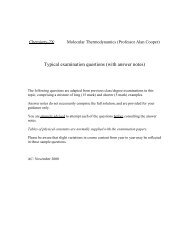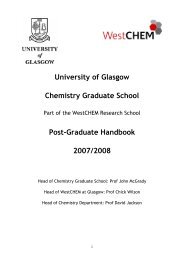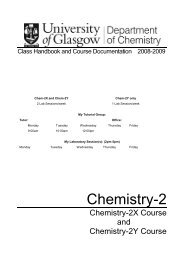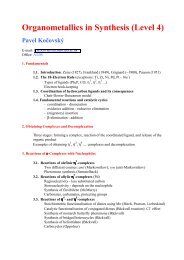Chemistry Study [PDF] - University of Glasgow
Chemistry Study [PDF] - University of Glasgow
Chemistry Study [PDF] - University of Glasgow
Create successful ePaper yourself
Turn your PDF publications into a flip-book with our unique Google optimized e-Paper software.
We <strong>of</strong>fer employability and pr<strong>of</strong>essional<br />
development training to all our students in<br />
years one and two <strong>of</strong> their degrees.<br />
<strong>Chemistry</strong><br />
Degree: BSc, MSci<br />
Typical <strong>of</strong>fer<br />
Highers BBBB, preferably with two<br />
science subjects<br />
A-levels BBB, preferably with two<br />
science subjects<br />
IB 30 points including three science<br />
subjects<br />
For entry requirements visit www.glasgow.ac.uk/<br />
undergraduate/degrees/entryrequirements<br />
Many <strong>of</strong> our degrees have common first and<br />
second year chemistry courses. You make your<br />
choice <strong>of</strong> degree at the end <strong>of</strong> your second year.<br />
It is also possible for you to study for a Joint<br />
Honours degree, combining one <strong>of</strong> the chemistry<br />
options with another subject.<br />
What can I expect in first year?<br />
In your first year you will study <strong>Chemistry</strong> 1<br />
with two other subjects. <strong>Chemistry</strong> 1 involves<br />
lectures and problem sessions or tutorials in a<br />
one-hour period each day, together with a threehour<br />
laboratory each week. The topics covered<br />
include:<br />
• The periodic table and main group chemistry<br />
• Transition metal chemistry<br />
• Organic chemistry<br />
• Chemical kinetics<br />
• Theoretical chemistry<br />
• Chemical energy changes<br />
• Aqueous equilibria and pH<br />
• Macromolecules.<br />
What can I expect in second year?<br />
In second year half your time will be spent<br />
studying chemistry and half is spend studying<br />
another subject. The chemistry at Level-2<br />
builds on the first year course and involves the<br />
following topics:<br />
• Molecular thermodynamics<br />
• Organic stereochemistry<br />
• Quantum mechanics, chemical bonding and<br />
symmetry<br />
• Organometallic chemistry<br />
• Main group chemistry<br />
• Enols and enolates<br />
• Spectroscopy<br />
• Kinetics<br />
• Aromatic chemistry<br />
• Coordination chemistry<br />
• Organic synthesis<br />
• Biophysical chemistry<br />
• Applied organic chemistry.<br />
You will attend two three-hour laboratory<br />
sessions per week. These reinforce and<br />
extend the material in lectures and allow<br />
you to develop practical skills. Small-group<br />
tutorials are also held every two weeks with<br />
a member <strong>of</strong> staff. Finally, we have two<br />
interactive teaching units that concentrate on<br />
ethical, environmental and financial issues in<br />
chemistry. These are designed to help you<br />
develop team working and presentation skills.<br />
What happens next?<br />
If you successfully complete the courses in<br />
first and second years, you may progress to<br />
Honours. At the end <strong>of</strong> second year you decide<br />
what degree programme to follow for your third<br />
and fourth years and, in the case <strong>of</strong> the MSci<br />
programmes, for fifth year as well. The MSci<br />
degree is ideal if you intend to pursue a career<br />
as a pr<strong>of</strong>essional chemist. If you do not wish<br />
to study to Honours level, there is provision<br />
for graduating at the end <strong>of</strong> Level-3 with a<br />
designated degree.<br />
Each degree programme has a set <strong>of</strong> core<br />
courses that all students must take. In addition,<br />
you select a number <strong>of</strong> optional courses from<br />
topics at the frontiers <strong>of</strong> chemistry. These<br />
optional courses are subject to revision and will<br />
change as chemical research topics develop<br />
within the highly research active department.<br />
In third year, our laboratory classes help you<br />
gain the skills in modern chemistry techniques.<br />
The chemistry courses contain a roughly equal<br />
mix <strong>of</strong> organic, inorganic and physical chemistry,<br />
although you specialise in the optional courses.<br />
The topics covered in the chemistry degree<br />
programme at Level-3 include:<br />
• Mechanistic organic chemistry<br />
• Organic synthesis<br />
• Controlling stereochemistry<br />
• Sugars and steroids<br />
• Reactive intermediates<br />
• Main group chemistry<br />
• Coordination chemistry<br />
• Heterogeneous catalysis<br />
• Organometallic chemistry<br />
• Solid state chemistry<br />
• Bio-inorganic chemistry<br />
• Biomolecular interactions<br />
• Quantum mechanics and symmetry<br />
• Kinetics<br />
• Spectroscopy<br />
• Diffraction<br />
• Photochemistry.<br />
In your fourth year, you will do an extensive<br />
research project in our well-equipped research<br />
laboratories. You will also study a mix <strong>of</strong> core<br />
chemistry courses and options.<br />
Core courses include:<br />
• Organic spectroscopy<br />
• Advanced organic synthesis<br />
• Heterocyclic systems<br />
• Colloids and macromolecules<br />
• Statistical thermodynamics<br />
• Metals in medicine<br />
• Inorganic mechanisms<br />
• Homogeneous catalysis.<br />
Optional courses for chemistry currently include:<br />
• Pericyclic reactions<br />
• Polymers in organic chemistry<br />
• Vibrational spectroscopy<br />
• Metal oxides as advanced materials<br />
• Biomolecular separations<br />
• Electrochemistry.<br />
It is possible to do an MSci in this subject<br />
involving a total <strong>of</strong> five years. The MSci degree<br />
<strong>of</strong>fers the opportunity to spend a year in industry<br />
or doing research in a European university<br />
before returning for your final year <strong>of</strong> study.<br />
What are my career prospects?<br />
A chemistry degree provides not only knowledge<br />
<strong>of</strong> the subject but also training in taking<br />
decisions, analysis <strong>of</strong> problems, communication,<br />
calculations, use <strong>of</strong> computers, recognition<br />
<strong>of</strong> patterns, abstract ideas and symbolism,<br />
precision and awareness <strong>of</strong> risks. Our graduates<br />
are employed as chemists working in research,<br />
process development or analysis, as well as in<br />
management, marketing, environmental control,<br />
patents or finance.


![Chemistry Study [PDF] - University of Glasgow](https://img.yumpu.com/26854063/3/500x640/chemistry-study-pdf-university-of-glasgow.jpg)
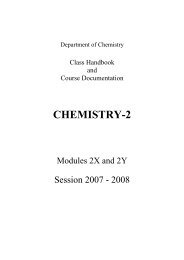

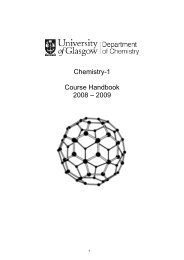
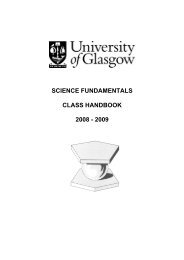
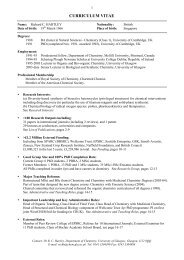
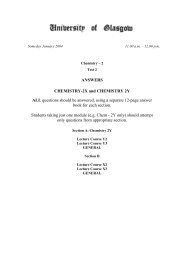
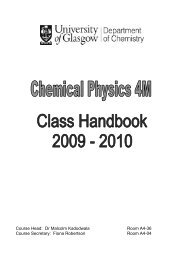

![Environmental Chemistry Study [PDF] - University of Glasgow](https://img.yumpu.com/26854018/1/184x260/environmental-chemistry-study-pdf-university-of-glasgow.jpg?quality=85)
